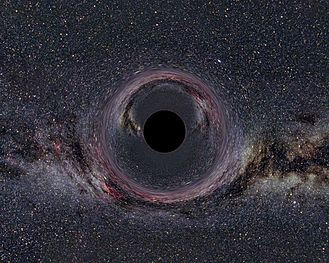
Black
Hole, an extremely dense celestial body that has been theorized to exist in the
universe.
The gravitational field of a black hole is so strong that, if the
body is large enough, nothing, including electromagnetic radiation, can escape
from its vicinity.
The body is surrounded by a spherical boundary, called a
horizon, through which light can enter but not escape; it therefore appears
totally black.
 |
The radius of the horizon of a Schwarzschild black hole depends only on the
mass of the body, being 2.95 km (1.83 mi) times the mass of the body in solar
units (the mass of the body divided by the mass of the Sun).
If a body is
electrically charged or rotating, Schwarzschild’s results are modified. An
“ergosphere” forms outside the horizon, within which matter is forced to rotate
with the black hole; in principle, energy can be emitted from the ergosphere.
According to general relativity, gravitation severely modifies space and time near a black hole.
According to general relativity, gravitation severely modifies space and time near a black hole.
As the horizon is approached from outside, time slows down relative
to that of distant observers, stopping completely on the horizon.
Once a body
has contracted within its Schwarzschild radius, it would theoretically collapse
to a singularity—that is, a dimensionless object of infinite density.
Black
holes are thought to form during the course of stellar evolution. As nuclear
fuels are exhausted in the core of a star, the pressure associated with their
energy production is no longer available to resist contraction of the core to
ever-higher densities.
Two new types of pressure, electron and neutron
pressure, arise at densities a million and a million billion times that of
water, respectively, and a compact white dwarf or a neutron star may form. If
the star is more than about five times as massive as the Sun, however, neither
electron nor neutron pressure is sufficient to prevent collapse to a black
hole.
Source:
Encarta


